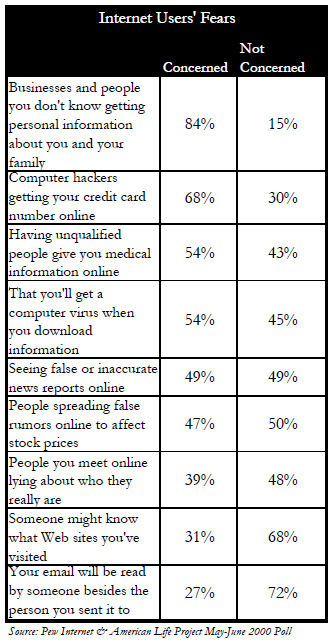Trust and privacy online: Why Americans want to rewrite the rules
In a season of growing concern about privacy on the Internet, The Pew Internet & American Life Project surveyed 2,117 Americans, 1,017 of whom are Internet users, from May 19 to June 21 about trust and privacy online. Their responses illustrated some fascinating cross currents on these issues. Online Americans have great concerns about breaches of privacy, while at the same time they do a striking number of intimate and trusting things on the Internet, and the overwhelming majority have never had a seriously harmful thing happen to them online.
On some major points, though, there is a powerful consistency: The first point is that American Internet users overwhelmingly want the presumption of privacy when they go online. The second point is that a great many Internet users do not know the basics of how their online activities are observed and they do not use available tools to protect themselves. The highlights of the survey:
Put users first
The vast majority of American Internet users want the privacy playing field tilted towards them and away from online companies. They think it is an invasion of their privacy for these businesses to monitor users’ Web browsing. By a two-to-one margin they reject the argument made by some firms that Web tracking can be a helpful, but users are willing to share personal information under certain circumstances.
- 86% of Internet users are in favor of “opt-in” privacy policies that require Internet companies to ask people for permission to use their personal information. This view challenges the policy just negotiated by the Clinton Administration, the Federal Trade Commission, and a consortium of Web advertisers, which gives Web sites the right to track Internet users unless the users take steps to “opt out” of being monitored.
- 54% of Internet users believe that Web sites’ tracking of users is harmful because it invades their privacy. Just 27% say tracking is helpful because it allows the sites to provide information tailored to specific consumers.
- 54% of Internet users have chosen to provide personal information in order to use a Web site and an additional 10% say would be willing to provide it under the right circumstances. 27% are hard-core privacy protectionists and would never provide personal information.
Some users employ guerrilla tactics, but most don’t exploit the privacy-protecting tools that already exist
In order to protect their privacy, a relatively small number of savvy users are devising their own “opt-in” policies and deciding that some Web sites are not worthy of getting their personal information. But most users do not use available privacy-protection tools, perhaps because they are unaware of how Web sites work and how existing technologies can be deployed to protect them.
- 24% of Internet users have provided a fake name or personal information in order to avoid giving a Web site real information.
- 9% of Internet users have used encryption to scramble their email.
- 5% of Internet users have used “anonymizing” software that hides their computer identity from Web sites they visit.
- 56% of Internet users cannot identify the primary online tracking tool. It is called a “cookie,” and it is a text file that is placed on a user’s computer by a Web site to help track that user’s browsing activities. Despite Americans’ high anxiety about being monitored online, only 10% of Internet users have set their browsers to reject cookies.
Companies should keep their promises – or else
Internet users want to punish firms and their executives when they violate users’ privacy.
- 94% of Internet users want privacy violators to be disciplined. If an Internet company violated its stated privacy policy and used personal information in ways that it said it wouldn’t, 11% of Internet users say the company’s owners should be sent to prison; 27% say the owners should be fined; 26% say the site should be shut down; 30% say the site should be placed on a list of fraudulent Web sites.
The actual incidence of unpleasant events is modest and the incidence of criminal events online is miniscule…
Despite their deep-seated concerns, Americans have not been victimized online in great numbers.
- 28% of Internet users have gotten an offensive email from a stranger.
- 25% of Internet users have had a computer infected by a virus, most likely from an email.
- 17% of Internet users (and 11% of Americans) know someone who was fired or disciplined because of email they sent or the Web browsing they did at work.
- 4% of Internet users have felt threatened in some way while they were online.
- 3% of Internet users have been cheated when they tried to buy something online.
- Fewer than 3% of Internet users say their credit card information has been swiped online.
… and the incidence of trusting activities is high
Americans continue to trust email, surf the Web for advice about intimate aspects of their lives, make friends online, and turn to Web sites for health information, for spending their money, and for material about their finances.
- 48% of Internet users have bought something online with a credit card; 55% have sought health information; 43% have sought financial information such as stock prices.
- 36% of Internet users have gone to a support-group site or one that provides information about a specific medical condition or personal situation. Of those, 24% have signed in with their real name or email address, or written about their own experiences for other people to read.
- 25% of Internet users have made friends with someone online that they never knew before in the offline world.
- 26% of Internet users have responded to an email from someone they don’t know.
- 22% have put information on online calendars and used online address books.
The things that concern Internet users





